Despite a new 15% tariff from the United States taking effect Thursday, Nigeria remains resolute in its trade strategy, pivoting toward regional and emerging global markets.
Speaking to CNN on Wednesday in Nigeria’s first official response to the tariff, Trade Minister Jumoke Oduwole framed the U.S.–Nigeria relationship as primarily energy-focused and signaled a shift toward broader trade diversification.
“The global marketplace offers vast possibilities,” Oduwole said. “We’re actively pursuing trade integration through the African Continental Free Trade Area (AfCFTA). In fact, our non-oil exports to African countries grew by 24% year-over-year in the first quarter.”
The minister’s recent tone contrasts sharply with her remarks in April, when a 14% U.S. tariff under the Trump administration was met with concerns about lost market access and diminished price competitiveness for Nigerian non-oil goods.
This time, Nigeria appears more confident. Oduwole acknowledged the U.S. market’s size and importance but emphasized the country’s expanding commercial horizons—especially toward Asia and the Global South.
“Brazil, for example, has a strong demand for our urea fertiliser,” she noted. “We also have ongoing trade engagements with China, Japan, the UAE, and other nations. These relationships are part of a broader strategy to create new opportunities for Nigerian exporters.”
While the U.S. remains a valued trading partner, Nigeria is focusing its economic investment strategy on infrastructure development, agricultural growth, and digital commerce.
“We appreciate our long-standing allies, but we’re equally committed to building new ones,” she added.
The 15% tariff follows an earlier suspension in April, when the U.S. had hinted at potential negotiations. Nigeria chose not to engage, despite enjoying a $3.29 billion trade surplus with the U.S. at the time. In July, former President Trump escalated tensions further by threatening an additional 10% tariff on BRICS-aligned nations—including Nigeria, which officially joined BRICS as its ninth member in January 2025.
It remains unclear whether the new tariff will apply to Nigeria’s oil and gas exports, which form the backbone of its foreign earnings and dominate its trade with the United States. These commodities were exempt during the initial round of tariffs earlier this year.

